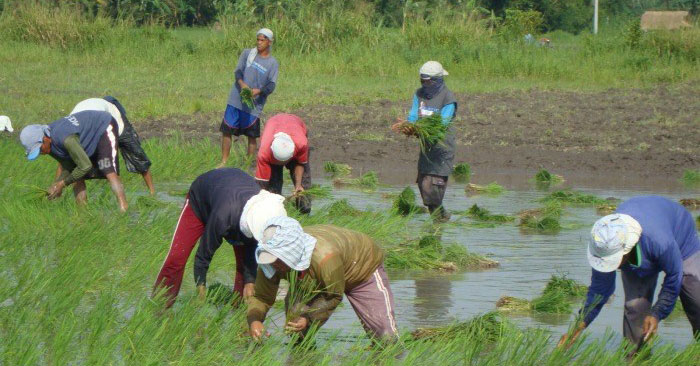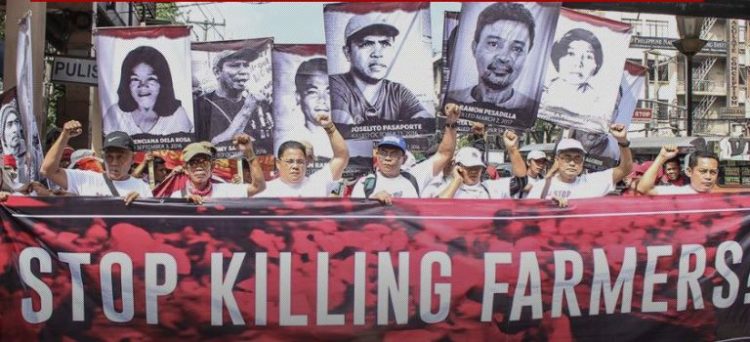Since it assumed power in July 2016, the administration of Philippine President Rodrigo Duterte has been earning criticisms from the international community for its blatant disregard for human rights. A particular concern is its bloody war on drugs, which has reportedly killed several thousands already mostly from urban poor communities in the capital.
Equally alarming but unfortunately getting far less attention is the State’s continuing war against the country’s peasantry, the biggest and yet the most neglected and marginalized sector of Philippine society.
Of the 68 victims of extrajudicial killings during the first year of the Duterte administration, 66 were farmers, farmer-community leaders, and land rights activists, according to a report by the national human rights advocacy group Karapatan. This translates to more than five killed every month or at least one every week in the past year.
It is not surprising, therefore, that Global Witness, an international group campaigning against human rights abuses, has declared the Philippines to be among the world’s most dangerous places for land and environmental defenders. In 2016 alone, the group has monitored 28 cases of killings, the third highest figure recorded, next only to Brazil and Colombia.
Most farmer killings occurred in agricultural regions where there are ongoing land disputes between farmers and local landlords or big agro-business and mining companies such as Cagayan Valley, Central Luzon, Southern Tagalog, Bicol, Negros, Panay, Caraga, Southern Mindanao, Northern Mindanao, and the Autonomous Region of Muslim Mindanao. Most of the victims were community leaders or members/officers of local peasant and indigenous people’s organizations affiliated with the Kilusang Magbubukid ng Pilipinas or Peasant Movement of the Philippines (KMP), fighting for genuine land reform and resisting the loss of ownership and control over their land and resources.
The first victims of extrajudicial killings under the Duterte administration were three farmers belonging to the indigenous group Higaonon from Sumilao, Bukidnon in Mindanao. Raymar Mayantao, Rogen Sindangan, and Cenon Nacaytona were shot dead on July 12, 2016 – just twelve days after the new president assumed office – by 13 security personnel hired to guard a ranch operated by Ramcar Inc. The three, together with others from their tribe, set up camps inside the ranch in an attempt to reclaim the 2,400 hectare-land granted to the company which they claim as part of their ancestral domain.
Similarly, on September 3, farmers Baby Mercado, Violeta Mercado, Eligio Barbado, and Gaudencio Bagalay were killed in Palayan, Nueva Ecija, after members of the AFP opened fired at them and other members of Alyansa ng mga Magbubukid na Nagkakaisa 3100 or Alliance of Farmers United (ALAMANA 3100) participating in the “bungkalan” or collective farming inside the 3,100 hectare-land declared in the 1990s by the government as part of its land reform program to which all the members are beneficiaries. The land, which is part of the Fort Magsaysay military reservation, however, is being eyed as the relocation site for the New Bilibid Prison (NBP), the country’s national penitentiary.
Duterte’s “all out war” vs the NPA and the declaration of martial law in Mindanao
Human rights and peasant organizations point to the military, paramilitary groups, and private security of landlords and companies as the alleged perpetrators of the killings. Independent monitoring by Karapatan and its nationwide network attributes more than half of the killings to the Armed Forces of the Philippines (AFP) conducting counter-insurgency operations against the rebel group New People’s Army (NPA).
Karapatan blames the government’s counter-insurgency program “Oplan Kapayapaan” and its predecessor “Oplan Bayanihan” for the killings of indigenous people and peasants, and the forcible evacuation of communities that the military tag as NPA supporters, as well as the illegal arrests and detention of activists. (“Bayanihan” is the Filipino word for communal unity and cooperation while “Kapayapaan” literally means peace.)
The state-perpetrated killings further escalated after the AFP declared an “all out war” against the NPA on February 2. Since then, 41 farmers – or, in the estimate of peasant group KMP, one farmer every two days – have been killed.
Only a day after the declaration, two indigenous farmers were killed: Matanem Lorendo Pocuan and Renato Anglao, both from Bukidnon province in Mindanao. Pocuan was a respected elder of the indigenous Omayam/Matigsalog tribe greatly opposed to military operations in his community and tagged by the AFP as an NPA supporter. He was shot at close range by a member of the paramilitary group Alamara. Anglao, on the other hand, was a leader of a mass organization of the indigenous Manobo-Pulangion tribe opposed to the entry of agri-business plantations in their ancestral land. He was shot by three unidentified men on board a motorcycle.
Lorendo Borres and Ian Borres, on the other hand, were killed by members of the 61st Infantry Battalion of the Philippine Army (IBPA) themselves, who indiscriminately fired at them and five others while resting after a day of work on their corn field in Maayon, Capiz, on February 24. The said unit claimed them to be members of the NPA, an allegation that their families denied.
The declaration of martial law in Mindanao on May 23 due to the activities of a local armed group in Marawi City claiming connection with the international terrorist group ISIS raised fears among human rights and peasant organizations of greater military harassment, abuses, and violation of the human rights of farmers and indigenous peoples. Mindanao, ironically where President Duterte is originally from, is home not only to resource-rich ancestral land but to peasant and Lumad (indigenous people) struggles against big agri-business and mining operations. More than half of the extrajudicial killings in the past year occurred in Mindanao.

Lack of genuine land reform
Filipino farmers have historically been among the most neglected and marginalized in society. The political and socio-economic structure in the Philippines makes farmers, together with the indigenous peoples, the first victims of land-dependent, capital intensive projects undertaken either by local landlords, domestic and foreign companies, or the State.
During the campaign period, Duterte, who is the country’s first President from Mindanao, sought the support of farmers with his promise to fast track the distribution of agricultural lands under the 30-year-old Comprehensive Agrarian Reform Program (CARP). Immediately after winning the elections, he appointed as head of the Department of Agrarian Reform (DAR) a prominent national peasant leader with a proven track record in promoting and defending the rights of poor farmers. This move earned the praise not only of those from the peasant sector, but also of those advocating for the farmers and land rights in the government, non-government organizations, and the academe.
It’s been one year since Duterte came to power, but for groups like KMP, no real change has occurred. Indeed, instead of securing their ownership, control, and access to land, more farmers and indigenous peoples are experiencing different forms of human rights violations. Haciendas and other large landholdings remain intact while huge tracts of productive land continue to be converted for non-agriculture use.
These disputed lands serve as battlegrounds for the Filipino farmers’ struggles – a conflict that has already claimed many among their ranks. But it is also a conflict that will persist and the farmers will have to face as long as landlessness and injustice remain. ###
#NoLandNoLife Features discuss recent developments, events, and trends on land and resource grabbing and related human rights issues in the region as well as the factors and forces that drive it. Send us your feedback at nolandnolife@panap.net.








Discussion about this post